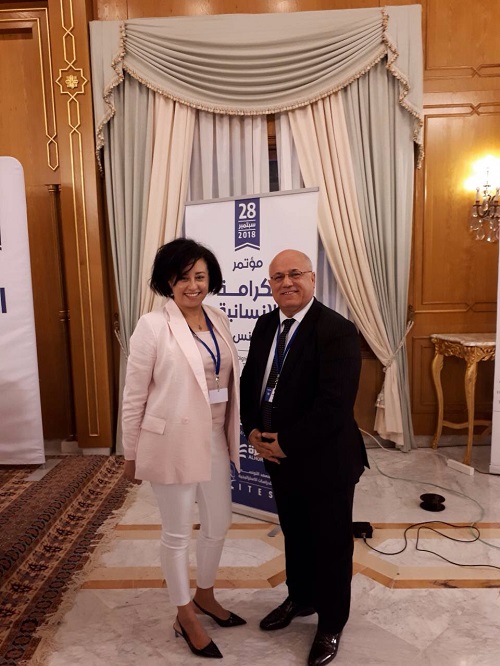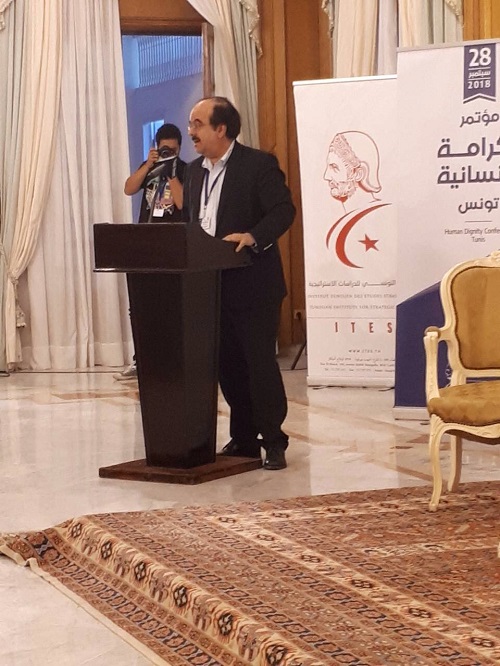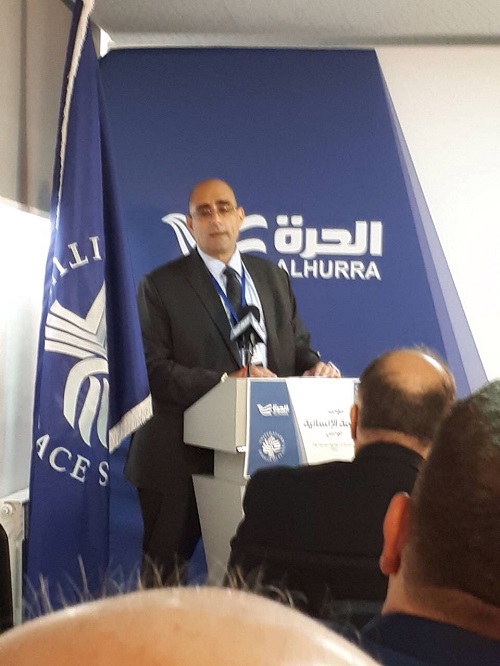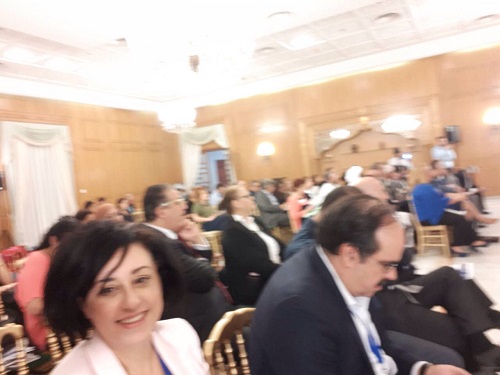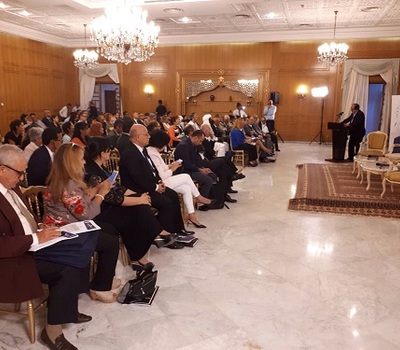
Emphasize the importance of the outcome of the conference is fruitful and that the selection of participants came in accordance with their experiences and diverse expertise
- Governance, institutions and individual tendency versus collective tendency and women's dignity based on their rights, religion and education are the titles discussed by the groups
- Mr. William Warda in his interventions address the problem of governance and institutions and the pressures on mechanisms of action
- Mr. Warda propos to establish an observatory to measure respect for human dignity and to create a code of honor for that purpose
Mr. William Warda, Public Relations Officer at Hammurabi Human Rights Organization, participated in the conference on Human Dignity held in Tunis on 28 September 2018 and supervised by the United States Institute of Peace in partnership and cooperation with the Tunisian Institute for Strategic Studies and Alhurra satellite TV channel
The conference was attended by academic figures and experts with diverse experiences from many countries in the Middle East and North Africa.
The conference, which lasted for one day, included a speech by Mr. Elie Abu Aoun, Director of the United States Center for Peace for the Middle East and North Africa, in which he called for fruitful results in light of discussions that will be held especially that the participants have diverse experiences and expertise in their countries and the choice of Tunis as a venue for the conference comes in the light of openness and democratic atmosphere enjoyed by.
Also speaking at the opening ceremony was the US Ambassador Alberto Fernandez, noting that the conference is the first part of an intensive series being funded by the NBN and Alhurra satellite TV channel. to support values that promote human dignity, such as tolerance, free and monetary thought, freedom, equality and others.
In the context of the proceedings of the first session, the intellectual and human rights leader in Lebanon, Dr. Wael Khair, discussed the issue of human dignity and the stages it has undergone in the framework of the international community concern and how human dignity has penetrated the international laws and procedures that have led to the stabilization of dignity in conventions, treaties and protocols on human rights.
The participants were then divided into four groups. The first group was headed by Dr. Mona Fayyad. Its members were Mr. William Warda discussing governance and institutions, while the second group dealt with the subject of individual tendency versus collective tendency and was managed by Dr. Imad Al-Salami, the third group was headed by Mrs. Amal Jarami dealt with the subject of women's dignity under the rights that should be available to them, Mr. Hisham Al-Hashemi took over the fourth group, whose discussions came under the title of religion, education and precedence of their own and what education should be in building the necessary civil personality.
After extensive discussions within the committees, each group presented its most important outputs to the rest of the teams, the conference was then presented at a panel discussion where four of the participants gave an overview of the main themes raised on the promotion of human dignity in the Middle East and North Africa region and their relationship to conflict prevention and ability to withstand and security in the region.
Mr. Warda intervened in more than one talk during his participation in the Governance and Institutional Group, focusing on facts from the field pointing out that the problem that lies in the regimes in the Middle East and North Africa is that the institutional bases are not available for the most part. If there are institutions, most of them are managed with individual beliefs and not within the framework of interaction and integration of views. Mr. Warda concluded that the standards of governance and institutions are exposed to a lot of political pressures due to the dire economic conditions and regional and international interventions in the general fabric of countries in this region.
Mr. Warda concluded in his interventions to the need to adopt effective mechanisms to address the issue of human dignity in order to have an observatory to measure the respect of human dignity in building healthy and inclusive societies according to the description mentioned in the conference paper and that the creation of an alternative discourse calling for sound solutions to conflict resolution is essential in any move to promote the concept of dignity, , because wars do not bring peace but ruin, destruction and deepening pain. The Geneva Conventions of 1949 on the protection of civilians are an important basis for preserving human dignity and not touching them therefore, it is necessary to re-activate these agreements and the adoption of the ratification of an international condition that can not be repudiated in any way, and this requires stakeholders to work under cultural and media mechanisms to strengthen this, and the organization of questionnaires to know and see what citizens see trends serve to protect their dignity and to remove any trends that undermine this dignity , putting the results of these questionnaires on the media and cultural implementation table as a moral standard ,pushing for the establishment of a Honor Code in the North African and Middle East region is a commitment to the principles that safeguard human dignity and can be subscribed to the completion of this Charter in order to establish a standard in that and a joint address for all. And that this conference will emerge as a permanent committee that will follow up on the executive mechanisms resulting from it, or that the efforts of those concerned will be lost with the dissolution of its work.
On the sidelines of the conference, Alhurra channel met Mr. William Warda in Tunis. He expressed the dilemma facing human dignity and the level of challenges in light of continuing violence and conflicts in the region. The benefits of imposing security are often at the expense of infringing people's rights and violating their dignity and that creating a balance between imposing security and respecting human dignity is not easy in situations such as Iraq, Syria, Yemen and elsewhere.
